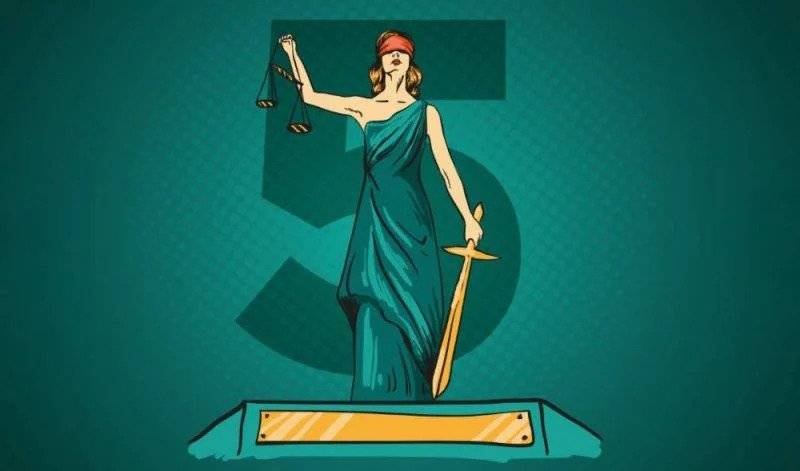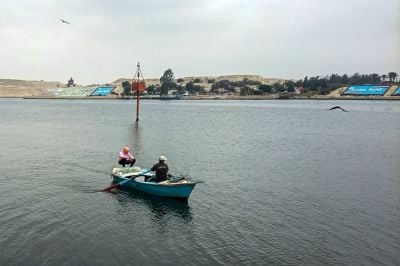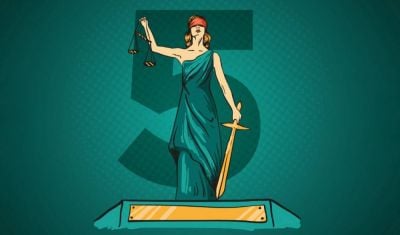
Illustration: Kulluna Irada
Nearly 40 months have passed since Lebanese banks ceased payments and one of the most serious economic and financial crises in recent history broke out, yet no one has been held accountable.
Not a politician, not a civil servant, not a banker, not, of course, Banque du Liban governor Riad Salameh, whose exact job is to ensure the banking sector is sound and the national currency stable. All those who have been in power for three decades — albeit to varying degrees — are still in command.
This impunity is inseparable from the regime that has governed Lebanon since the end of the Civil War and whose first major act was to vote an amnesty law for war crimes.
Militia leaders-turned-lawmakers, together with all kinds of wheelers and dealers, have given themselves carte blanche to manage the resources of a whole country, including the savings of its diaspora.
As a result, a tremendous loss — unparalleled in the world in terms of its magnitude — was imposed on depositors, and on Lebanese society in general.
Shirking any responsibility
For more than three years, promises of reform have had only one objective: to stall and escape responsibility.
The conclusion of a staff-level agreement with the International Monetary Fund in April is no exception.
The “deliberate” nature of the inaction has been rightly highlighted by the World Bank. The mafiocracy that governs Lebanon outside of state institutions will never be able to face those it has robbed, because that would mean admitting culpability.
It therefore chooses to kick the can down the road regardless of the cost to society, while making sure it perpetuates its external legitimacy — hence holding parliamentary elections — and retains its domestic support.
In fact, in return for colossal losses, Lebanon has also been the scene of massive transfers of wealth over the past 30 — and last three — years.
Substantial gains have been allocated, in varying proportions, to the pillars of the power system. One would not otherwise understand the continuity of the system. To this day, while some Lebanese are now forced to buy rice by the glass, others are getting rich without risk thanks to the monetary engineering that the BDL governor continues to mastermind through circulars devoid of any democratic legitimacy.
The restructuring of the banking sector has been the focus of all discussions for three years. It is indeed essential for the recovery of the economy.
There will be no monetary and fiscal policies possible — the two pillars of public action — without the restructuring of BDL. There will be no private investment, the key to recovery, without a functioning banking system.
However, it is important to understand why this restructuring has not taken place for more than three years. All the draft laws that claim to come under this heading have two main objectives that are the opposite of ours.
The first is to escape liability. The second is to protect the financial and patrimonial interests of a very small number of people, even if it means increasing tenfold the losses suffered by the overwhelming majority of depositors, and the Lebanese in general.
The capital control draft law is a flagrant example. Behind the stated objective, which should have been implemented as early as 2019, the various texts under consideration have only one aim, that of protecting the banks from any legal proceedings.
The draft law to rebalance the financial system, recently submitted to the Budget and Finance parliamentary committee, is another illustration. Beyond its title, this text, which claims to organize the allocation of losses, does not include any figures or rough estimates beyond the recapitalization of BDL to the tune of $2.5 billion — an estimate that dates back to a year ago and is disconnected from any fiscal, financial or macroeconomic projections.
Similarly, the claim that accounts of up to $100,000 will be guaranteed is not supported by anything. On the other hand, the text states the transfer of the vast majority of bank liabilities to a misleading and deceptively named “deposit restitution” fund, thereby absolving the banks of their liability.
The true ‘rights of depositors’
Three years after the crisis broke out, depositors’ rights are still invoked as a shield to avoid public accountability, while a policy of “lirification” of deposits is being implemented that has imposed massive de facto haircuts on them in a discretionary and arbitrary manner.
The first right of depositors, enshrined in the law, is to sue the bank that does not honor what it owes: in any bankruptcy, there are rules, and the shareholders’ capital comes first in line. What is happening today is the exact opposite.
Depositors also have the right to demand that light be shed on all transactions made after Oct. 17, 2019, because not all depositors are in the same boat.
The first right of the depositors, and of the Lebanese in general, who have been robbed and continue to be robbed day after day, is to demand accountability. The levels of responsibilities are clear and distinct. There is that of the boards of directors, the majority shareholders, the executive directors and the auditors of the banks.
There is that of the BDL governor, who is simultaneously the monetary, supervisory and regulatory authority of the sector, as well as the judicial authority for all financial crimes.
Finally, there is that of the holders of the legislative and executive powers, who are the custodians of public money and public interest. All of them bear political responsibility for this monumental bankruptcy.
Each one of them must also assume their criminal responsibility, since there are numerous, systematic suspicions of insider trading, personal enrichment, misuse of public property, embezzlement of public funds, money laundering and more.
Five requirements
Reestablishing the rule of law means restoring the principle of justice. Three decades after the amnesty for war crimes, while political assassinations remain unpunished and the investigation into the Beirut port explosion is deliberately obstructed, we are committed to fighting any attempt to absolve those responsible for the economic tragedy imposed on the Lebanese.
That is why we are making the refusal of a new amnesty law the cornerstone of our approach to the restructuring of the financial sector that will prefigure the economic and social model of Lebanon in the coming years. This banking restructuring process must be based on five essential principles.
The first requirement is to include in the banking resolution law lifting bank secrecy by name so as to allow for the audit of all accounts above a certain amount and to determine which accounts have priority with respect to sums owed.
The eligibility criterion proposed by the authorities based on the date of conversion of Lebanese lira into dollars (after Oct. 2019) has no legal basis and its explicit objective is to arbitrarily reduce the banks’ liabilities. It should be replaced by a method based on the protection of mutual and pension funds of professional associations, universities, etc., as well as the verification of the origin of funds of all accounts above a certain threshold.
This will involve sorting out “legitimate” deposits from “illegitimate” ones resulting from acts of corruption, money laundering, tax evasion, embezzlement and other reprehensible acts incriminated or sanctioned by the laws in force. This will reduce the liabilities to the extent necessary.
Similarly, the accounts of public officials who are required to declare their financial situation under the law on illicit enrichment must be audited. This will take some time, but will be facilitated by the extreme concentration of bank deposits.
Before 2019, nearly half of the deposits belonged to fewer than one percent of depositors (22,700 accounts out of 2.7 million). In any case, the audit will only concern a limited number of accounts.
Secondly, the forensic audit of BDL, which was carried out by consulting firm Alvarez & Marsal, must be completed and its results published, as well as the financial audit carried out by Oliver Wyman.
In order to have a true picture of the exact valuation of the sector’s assets, these audits must be complemented by those of the banks, starting with the 14 largest ones, where the bulk of the deposits is focused.
To date, no company has been commissioned to do this work. These audits must also include two specific objectives: to trace all transactions carried out since Oct. 2019, on the one hand, and, on the other, the clearly excessive interest, dividends and bonuses paid since at least 2015 or even 2011. In fact, there is no possible allocation of losses without a prior reallocation of available resources.
Third, it is absurd to entrust the responsibility for restructuring the sector to the person who has held all the regulation and control powers over the past 30 years. We also categorically refuse the reappointment of Salameh, who should have been dismissed for failing to assume his duties or for serious misconduct. The very mention of reappointing Salameh testifies to the entrenched sense of impunity in the system.
Only a truly independent authority can steer the restructuring. The future of the sector therefore depends on revisiting the Code of Money and Credit in order to put an end to the concentration of all powers in the hands of the BDL governor, as well as to the subsequent conflicts of interest between the regulation and control tasks, on the one hand, and the objectives of monetary policy, on the other.
Fourth, while the current shareholders of the banks will be able to keep control of their institutions as long as they proceed with the necessary recapitalizations, they must first undergo investigations and have their assets frozen in order to verify that they have not violated their legal and prudential obligations.
This is the law in force in Lebanon, and the provisions of Law No. 2/67 (known as the “Intra” law) should have been applied by the courts as soon as banks defaulted (effective since Oct. 2019) in order to truly protect creditors, first and foremost depositors.
Finally, the fifth and final commitment is to hold political and administrative authorities accountable for their actions. This means, above all, adopting the two draft laws on the independence of civil and criminal justice and administrative justice in such a way as to effectively comply with international standards in this area.
This also involves activating the National Anti-Corruption Commission, whose primary task is to verify statements made by public officials concerning their assets. This also means initiating tax and judicial audits of all public contracts concluded between administrations and natural and legal persons to detect any waste or fraud.
Finally, this means activating the supervisory bodies, such as the Court of Audit or the Central Inspectorate, and giving them the means to carry out their tasks freely.
Ending the culture of impunity requires the rehabilitation of the judiciary, which will be able to implement the plan to fight corruption and recover ill-gotten funds approved by the Lebanese government in 2020. The goal is to establish responsibilities, but also to implement a process to claw back the ill-gotten funds so as to pay into a depositor compensation fund.
Signatories: Aldic, Kulluna Irada, Legal Agenda, the Observatory of the Rights of Depositors of the Beirut Bar Association, the Observatory of the Public Service and Good Governance of Saint Joseph University.
This piece was originally published in French in L'Orient-Le Jour. Translation by Joelle El Khoury.


